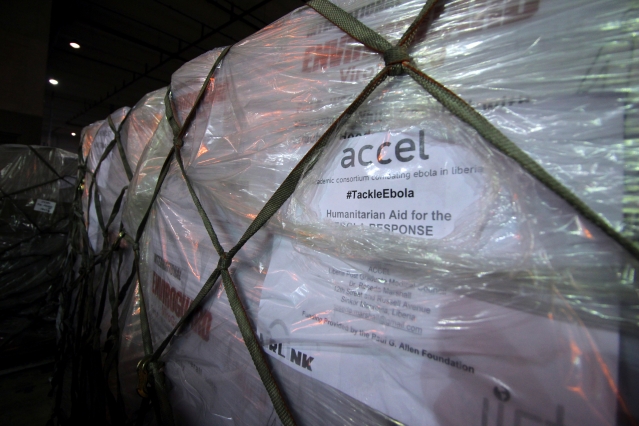Jaya Chimnani, Jarrod Goentzel, Marianne Jahre
Partner: ACCEL
Over the past seven years, the University of Massachusetts Medical School (UMMS) has led a consortium of academic medical centers including Boston Children’s Hospital/Harvard Teaching Hospitals, that supports medical education through clinical mentoring and direct patient care in multiple hospitals. In the wake of the Ebola Virus (EV) emergency, the consortium received a grant from Paul G. Allen, as part of the #TackleEbola initiative, to increase its support to build capacity for the Liberian hospital system. The Academic Consortium to Combat Ebola in Liberia (ACCEL) includes UMMS, Boston Children’s Hospital, MIT Humanitarian Response Lab, Avenir Analytics and Mt. Sinai Medical School. ACCEL is partnering with the Liberian Post Graduate Medical Council (LPGMC) on a program with three specific projects that have the following aims:
AIM 1. To provide direct, immediate relief on the ground through provision of emergency medicine physicians, infectious disease specialists and disaster management teams to engage with NGOs and provide expanded workforce capacity for care at EV treatment facilities.
AIM 2. To provide training, mentoring and support along with the necessary personal protective equipment (PPE) and decontamination and laboratory supplies, to enable the reopening of district and community hospitals, necessary to meet the basic health care needs of the population and to identify those potentially infected with Ebola Virus.
AIM 3. To support hospital laboratory function, blood banking and transfusion services in the country.
The initial logistics effort supports Aim 2 – a national health system intervention to provide appropriate supplies coupled with infection prevention and control (IPC) training with long term quality monitoring to protect health care workers in hospitals throughout the country. Many of these facilities are currently closed due to (i) lack of PPE, (ii) lack of knowledge about recognition and containment of Ebola Virus, and (iii) subsequent fear of contracting the EV. This intervention enables facilities to resume critical health services, builds public confidence in the healthcare system, and strengthens national capacity in EV education and control for the future. Our work supports current efforts led by the Liberian Ministry of Health and Social Welfare (MOHSW), Rebuilding Basic Health Services (RBHS), and the Infection Prevention and Control (IPC) task force.
ACCEL consortium partners will work with its established network of physicians and healthcare workers to form teams that provide Ebola prevention and safety training to health care, lab, and sanitation workers at several health facilities in the most affected areas. These hospitals can then safely provide health services and referrals to Ebola Treatment Units (ETUs). Training requires appropriate personal protective equipment (PPE) supplies for effectiveness. In addition to the IPC training, implementation and monitoring, we will assess the supply chain of PPE and provide a base stock of three months supply for the health facilities. For several months following initial training, we will monitor the outcomes of training and ongoing health facility operations. During this time we will transition training efforts and management of the supply chain to the MOHSW and partners.
The MIT Center for Transportation & Logistics and Avenir Analytics have joined ACCEL to provide logistical support for the response effort and transition support for the Liberian MOHSW and its partners to sustain the supply chain.
For more information about this effort, please read the following news article, Launching a Vital Link in the Ebola-Response Effort.

